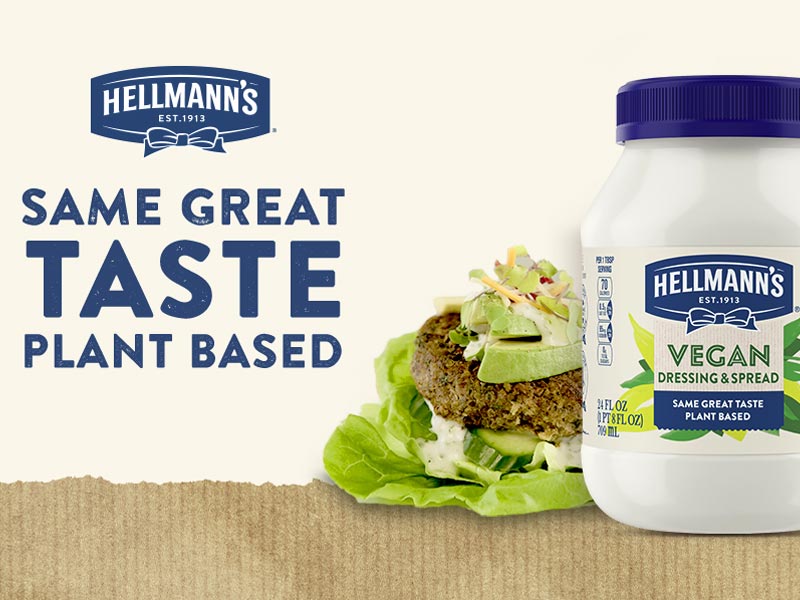The traditional recipe for mayonnaise generally includes eggs, which serve as both an emulsifier and a source of fatty acids. However, egg production poses ethical and environmental problems, particularly in terms of animal welfare, greenhouse gas emissions and water use. In addition, eggs are a common allergen, limiting access to traditional mayonnaise for people with dietary restrictions or allergy.
In response to these concerns, a growing number of consumers are looking for plant-based alternatives to traditional mayonnaise. Vegan mayonnaise offers a cruelty-free and environmentally friendly option that appeals to vegans, vegetarians and environmentally conscious consumers. Using plant-based ingredients such as oils, starches and proteins, these innovative condiments replicate the creamy texture and flavourful taste of traditional mayonnaise without the need for eggs.
Main companies in the vegetable mayonnaise market
Eat Just : Founded in 2011, Eat Just is a pioneer in the plant-based food industry, focusing on creating sustainable and ethical alternatives to animal-based products. Their flagship product, Just Mayo, has been widely acclaimed for its delicious flavour and creamy texture, quickly becoming a favourite among consumers looking for plant-based condiments.
Follow Your Heart: Founded in 1970, Follow Your Heart is a leading producer of plant-based foods, including its famous Vegenaise range of vegan mayonnaise. Made with non-GMO ingredients and no artificial flavours or preservatives, Vegenaise offers a healthy and tasty alternative to traditional mayonnaise.
Sir Kensington’s: Known for its commitment to quality and sustainability, Sir Kensington’s offers a range of condiments, including Fabanaise vegan mayonnaise. Made from aquafaba, the liquid resulting from cooking chickpeas, Fabanaise offers the rich texture and tangy taste of a traditional mayonnaise without the need for eggs.
Hellmann’s: Hellmann’s, a household name in the mayonnaise world, recognised the growing demand for plant-based alternatives and launched its own vegan mayonnaise based on soya oil. By expanding its product range to include vegan options, Hellmann’s aims to cater for a wide range of dietary preferences and needs.
Primal Kitchen: Founded on the principles of healthy eating and paleo-friendly ingredients, Primal Kitchen offers a range of condiments, including its avocado oil-based mayonnaise. Free from soya, canola oil and artificial additives, Primal Kitchen’s mayonnaise appeals to health-conscious consumers looking for a healthy alternative to traditional condiments.
Lesieur: Founded in 1908, Lesieur is a well-known French producer of edible oils and condiments. Aware of the growing demand for plant-based alternatives, Lesieur offers a new plant-based mayonnaise made from high-quality ingredients such as sunflower oil and mustard. With its culinary expertise and commitment to innovation, Lesieur remains a key player in the plant-based mayonnaise market in France and abroad.
Innovative techniques for replacing eggs
Replacing eggs in mayonnaise recipes presents a unique challenge. However, innovative scientists and chefs have developed creative techniques to reproduce the texture and flavour of traditional mayonnaise without using eggs.
Aquafaba, the viscous liquid produced when chickpeas are cooked, is a popular egg substitute. Aquafaba has emulsifying properties similar to those of egg whites, making it an ideal substitute for mayonnaise recipes. By whisking aquafaba with oil and vinegar or lemon juice, chefs can create a smooth, creamy mayonnaise substitute that rivals the traditional version in terms of taste and texture.
Another common method of replacing eggs is to use starches and proteins derived from plant sources such as potatoes, soya beans, peas or seaweed. These ingredients help to stabilise the emulsion and create a silky smooth texture, allowing the mayonnaise to retain its consistency without the need for eggs.
The major supermarket brands offer vegan sauces
As demand for plant-based alternatives continues to grow, major supermarket brands are increasingly expanding their range to include vegan sauces, including mayonnaise. Aware of the market potential and consumer preferences, these brands are capitalising on the trend towards animal-free condiments by launching their own lines of vegan mayonnaise and other plant-based sauces such as tofu bolognese and herb sauces.
One notable example is Tesco, one of the UK’s leading supermarket chains, which offers a range of vegan mayonnaises under its own brand. Made from high-quality ingredients and free from animal products, Tesco’s vegan mayonnaise appeals to a wide range of customers looking for ethical and sustainable condiments.
Similarly, Whole Foods Market, a renowned retailer specialising in natural and organic foods, offers a wide selection of vegan sauces, including mayonnaise, from different brands. With its commitment to environmental sustainability and animal welfare, Whole Foods Market is meeting the needs of consumers.
The vegetable mayonnaise market represents a dynamic and growing sector within the condiment industry. Driven by concerns about animal welfare, allergens, environmental sustainability and health, consumers are increasingly turning to plant-based alternatives to traditional mayonnaise. In conclusion, as vegetable mayonnaise continues to spread its creamy goodness across plates worldwide, it seems the days of egg-streme condiment choices are becoming a thing of the past. Bon appétit and mayo-nnaise to you!



